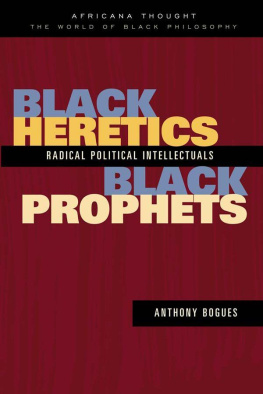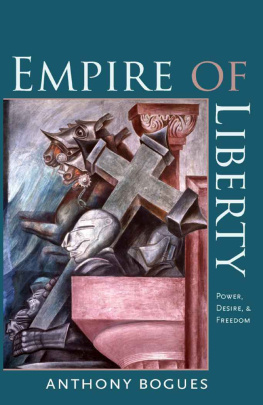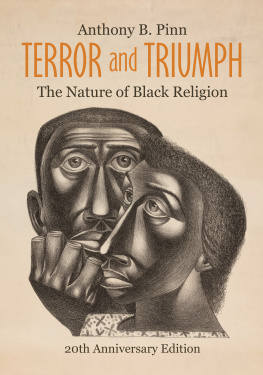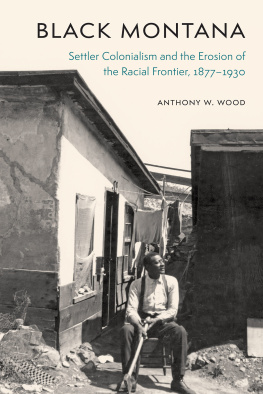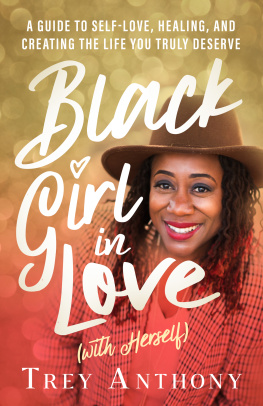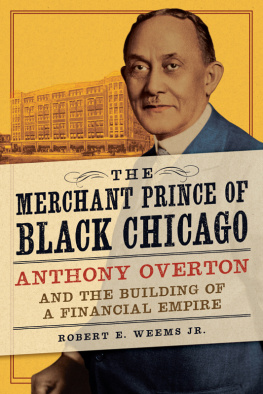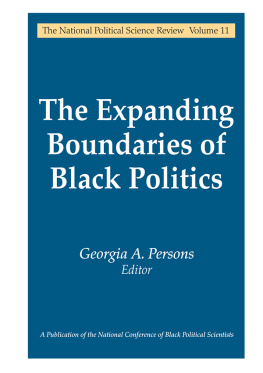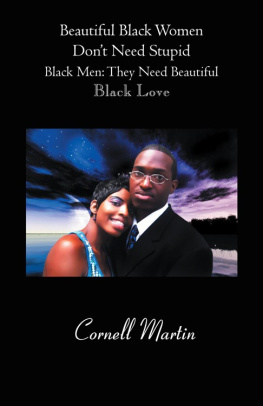Anthony Bogues - Black Heretics, Black Prophets
Here you can read online Anthony Bogues - Black Heretics, Black Prophets full text of the book (entire story) in english for free. Download pdf and epub, get meaning, cover and reviews about this ebook. year: 2015, publisher: Taylor and Francis, genre: Politics. Description of the work, (preface) as well as reviews are available. Best literature library LitArk.com created for fans of good reading and offers a wide selection of genres:
Romance novel
Science fiction
Adventure
Detective
Science
History
Home and family
Prose
Art
Politics
Computer
Non-fiction
Religion
Business
Children
Humor
Choose a favorite category and find really read worthwhile books. Enjoy immersion in the world of imagination, feel the emotions of the characters or learn something new for yourself, make an fascinating discovery.
- Book:Black Heretics, Black Prophets
- Author:
- Publisher:Taylor and Francis
- Genre:
- Year:2015
- Rating:5 / 5
- Favourites:Add to favourites
- Your mark:
- 100
- 1
- 2
- 3
- 4
- 5
Black Heretics, Black Prophets: summary, description and annotation
We offer to read an annotation, description, summary or preface (depends on what the author of the book "Black Heretics, Black Prophets" wrote himself). If you haven't found the necessary information about the book — write in the comments, we will try to find it.
Black Heretics, Black Prophets — read online for free the complete book (whole text) full work
Below is the text of the book, divided by pages. System saving the place of the last page read, allows you to conveniently read the book "Black Heretics, Black Prophets" online for free, without having to search again every time where you left off. Put a bookmark, and you can go to the page where you finished reading at any time.
Font size:
Interval:
Bookmark:

BLACK HERETICS,
BLACK PROPHETS
Books in the Africana Thought series:
Calibans Reason: Introducing Afro-Caribbean Philosophy
Paget Henry
Existentia Africana: Understanding Africana Existential Thought
Lewis R. Gordon
Cornel West and Philosophy
Clarence Shol Johnson
Black Heretics, Black Prophets: Radical Political Intellectuals
Anthony Bogues
Series Editors Lewis R. Gordon and Paget Henry
BLACK HERETICS,
BLACK PROPHETS
RADICAL POLITICAL INTELLECTUALS
ANTHONY BOGUES

First published 2003 by Routledge
Published 2016 by Routledge
2 Park Square, Milton Park, Abingdon, Oxon OX14 4RN
711 Third Avenue, New York, NY 10017, USA
Routledge is an imprint of the Taylor & Francis Group, an informa business
Copyright 2003 by Taylor & Francis Books, Inc.
All rights reserved. No part of this book may be reprinted or reproduced or utilised in any form or by any electronic, mechanical, or other means, now known or hereafter invented, including photocopying and recording, or in any information storage or retrieval system, without permission in writing from the publishers.
Notices
Practitioners and researchers must always rely on their own experience and knowledge in evaluating and using any information, methods, compounds, or experiments described herein. In using such information or methods they should be mindful of their own safety and the safety of others, including parties for whom they have a professional responsibility.
Product or corporate names may be trademarks or registered trademarks, and are used only for identification and explanation without intent to infringe.
Strange Fruit, words and music by Lewis Allan. Copyright 1939 (Renewed) by Music Sales Corporation (ASCAP). International Copyright secured. All rights reserved. Reprinted by permission.
So Much Trouble in the World, written by Bob Marley. Copyright 1977, Fifty-Six Hope Road Music Ltd./Odnil Music Ltd./ Blue Mountain Music Ltd. (PRS) adm. Rykomusic (ASCAP). All rights reserved. Used by permission.
Zimbabwe, written by Bob Marley. Copyright 1979, Fifty-Six Hope Road Music Ltd/Odnil Music Ltd./Blue Mountain Music Ltd. (PRS) adm. by Rykomusic (ASCAP). All rights reserved. Used by permission.
Babylon System, written by Bob Marley. Copyright 1979, Fifty-Six Hope Road Music Ltd./Odnil Music Ltd./ Blue Mountain Music Ltd. (PRS) adm. by Rykomusic (ASCAP). All rights reserved. Used by permission.
Cataloging-in-Publication Data is available from the Library of Congress.
ISBN-13: 978-0-415-94325-3 (pbk)
To all the youthman and youthdawtas of Craig Town and for my sons Samori, Machel, Nzinga, and Kilamba.
The writing of a book has many legs, and we should recognize that these legs make it a collective enterprise. Writing is a dialogue not only with the self but also with the social world. So one needs at the end of a writing project to explore these legs, to reflect upon the making of the book. This book originated in a series of night classes held in the inner-city community of Craig Town, Kingston, Jamaica, in 1999. In this community I was asked to conduct a series of classes in black history. What was amazing was that for about six months a group of young men, most of them unemployed and all living under oppressive conditions, came twice a week, learning the rudiments of reading and writing, staying late into the night speaking, listening, and questioning the ideas of some of the figures in this book. What began as a class in black history quickly became a discussion group about black radical ideas. The decision was made to write a book about the black radical intellectual tradition when one of these young men, in Jamaican vernacular, recounted some of the key political ideas of Walter Rodney, eloquently stating what those ideas had meant to him and the rest of the group as young black men living in a society that oppressed them along class and color lines. To these young men I owe a great deal, and I hope that the book will reflect some of the ideas we intensely discussed many nights, trying to keep alive a hope that their lives could be changed.
Since then a few of these young men have died at the hands of state forces, others have left the area, and still others are trying to make their lives better. A book is in no way a substitute for making social change, but writing can help to clarify some of the ideas about history and politics, ideas that are important for the execution of social change. It is because the unemployed youths of Craig Town for a brief moment demonstrated what was possible for all human beings, once we recognized ourselves in history and as active agents who can change both our condition and history, that the book was written.
In the fall of 1999, Lewis Gordon, with an intellectual generosity rare in the academy, suggested that I write the book for the Africana Thought series. He argued that another book I was working on could be done later. I want to thank him for his insistence. Paget Henry, the other editor of the series, provided valuable support during the writing, reading some of the drafts and making extensive comments. I wish to acknowledge his support. Since coming to Brown University in the fall of 1999, I have taught a senior undergraduate seminar, Africans and the West: A History of Ideas, in which the students have forced me to sharpen my analysis of the black radical intellectual tradition; their probing questions have reshaped many ideas in this text. I want to thank them for their contributions to this project.
Various chapters in different guises were given as talks at several forums. The ideas about Cugoano were first developed for a paper presented in 1999 at the American Philosophical Association conference in Boston, and I want to thank the audience who attended that panel for their questions. After that panel Robert Gooding-Williams invited me to present some of the ideas of the book at the Humanities Center at Northwestern University. Both the faculty and the student seminars stimulated me to think how the ideas about a black radical intellectual tradition could be reworked in the academy as integral to the study of political theory. I want to thank Robert for this invitation and for his continued support of my work. At Howard University the chapter on James and Du Bois was presented, and the rich discussion which ensued that Sunday morning shaped the historical ideas of that chapter; I want to thank Patrick Goodin for making that seminar possible. Patrick also hosted a conference on Afro-Caribbean philosophy at Howard in which I first outlined the nature of Dread history. I want to thank Linden Lewis for his encouraging comments at that forum. At the University of California, Irvine, I presented an overall conception of the book and ideas about the nature of the black radical intellectual tradition to the Afro-American Studies Program. I wish to thank all who participated in that seminar particularly those who saw the work as an attempt in the history of ideas.
Particular sections of this book would not have been written without the rich discussions that I have with members of the Small Axe Collective. In particular I want to thank David Scott for arguments about Dread history; Nadi Edwards, who knows more than most about the nature of the popular Caribbean aesthetic; and Val Carnegie, whose brief article on Robert Marley proved very valuable. Thanks are also due to the filmmaker Julian Henriques, for discussions about Dread history, and to one of my most talented graduate students, Greg Graham, who did the newspaper research on the Claudius Henry trial. Jana Lipman of Yale University allowed me to look at some original documents she found in the National Archives in Washington, D.C., that helped shaped the Rastafari chapter. Thanks are also due to my friend and colleague Rupert Lewis, who ever since he was my dissertation adviser has served as a sounding board for my ideas in gestation.
Font size:
Interval:
Bookmark:
Similar books «Black Heretics, Black Prophets»
Look at similar books to Black Heretics, Black Prophets. We have selected literature similar in name and meaning in the hope of providing readers with more options to find new, interesting, not yet read works.
Discussion, reviews of the book Black Heretics, Black Prophets and just readers' own opinions. Leave your comments, write what you think about the work, its meaning or the main characters. Specify what exactly you liked and what you didn't like, and why you think so.

